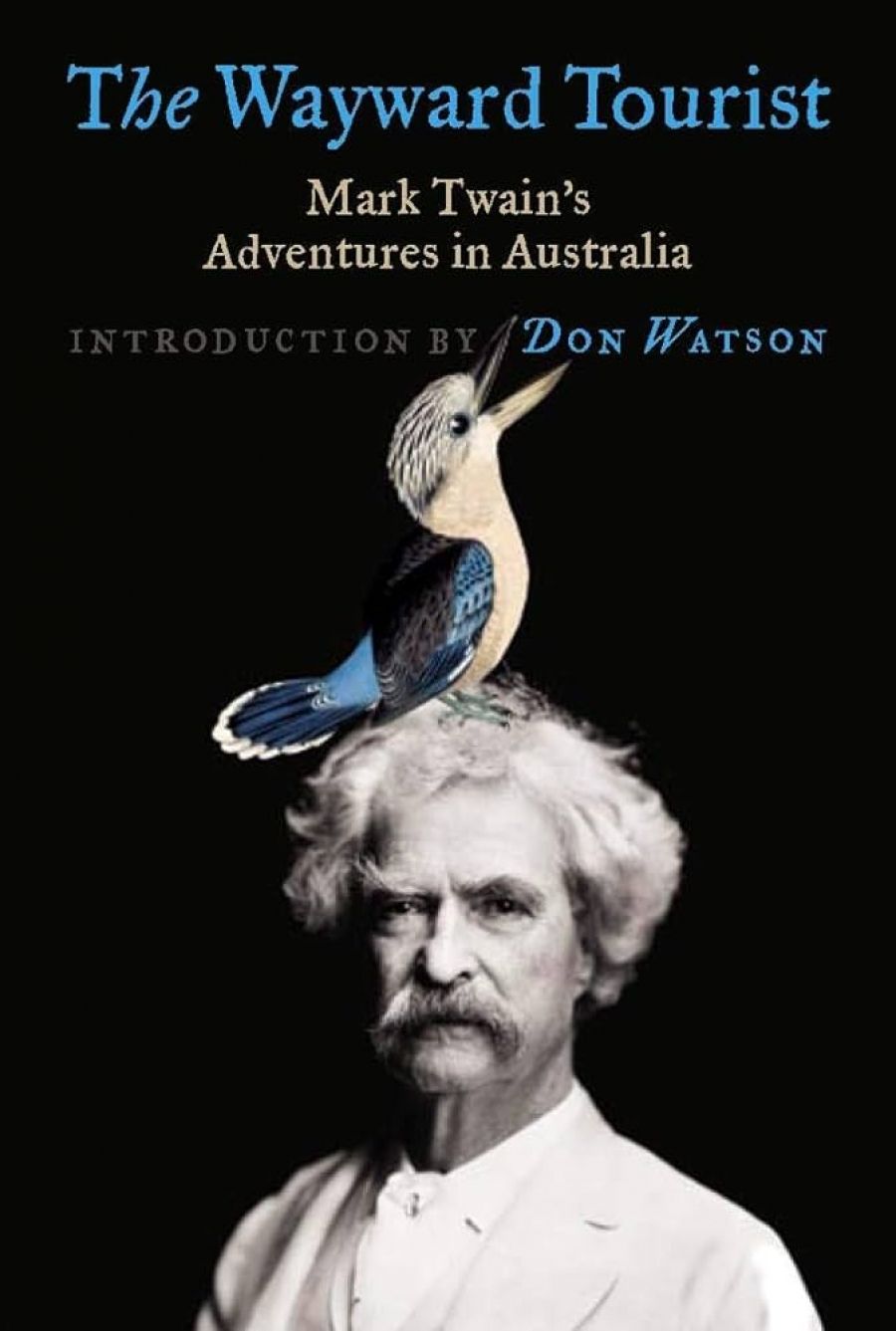
- Free Article: No
- Contents Category: Non-fiction
- Custom Article Title: The licensed fool's vocation
- Review Article: Yes
- Article Title: The licensed fool's vocation
- Online Only: No
- Custom Highlight Text:
Reading Mark Twain on Australia in the 1890s is a bit like watching Shane Warne bowl these days: you sense the playing up to the audience and an undignified element of hustle; a tendency to rely on the old tricks to fill the space and manufacture the laughs/wickets. And yet there’s no doubting the copiousness of the art, no resisting the tarnished genius on display. Sure, it would be nice to have more of the early Twain’s concentrated wit, and less reliance on showmanship, but to unwish this account of his antipodean travels would be aesthetically, emotionally, even morally wrong.
- Book 1 Title: The Wayward Tourist
- Book 1 Subtitle: Mark Twain's adventures in Australia
- Book 1 Biblio: MUP, $29.95 hb, 206 pp, 0522853129
- Book 1 Cover Small (400 x 600):

- Book 1 Cover (800 x 1200):

So it is remarkable what a cheerful book this is. It is, indeed, a little heroic, an assertion of the licensed fool’s vocation to spread laughter in the face of personal misery and indignity. There is something irrepressible about the way Twain’s observations – the obvious, the brilliantly perceptive, the just plain eccentric – twist their way into such envy-inducing sentences. To find out (as I did) after reading this happy account that it was produced at such a rotten time in his life is salutary about the humorist’s art, and the biographer’s. A biographer (e.g. Ron Powers’ recent and very good Mark Twain: A Life [2005] ) cannot help but find a meaningful blankness about the descriptions in this product of sadness – a dependence on retailed stories, cheap laughs, quotations from other books, gobbets of local history and social reportage. Once you hold it up that way, the case is undeniable, but it didn’t seem that way to me in my innocence. I’m not sure that I want to give up the unshadowed reading, or that I should. Biography risks turning even the happiest of works into the silhouette of a plangent back-story. To read for laughter and instruction (or just laughter, for that matter), you often need to isolate the words from their origins, to accept the fictions and focus on the objects observed.
Twain observed something little short of radiant prosperity in these colonies. Certainly there are reservations, most persistently and deservedly about the European treatment of Aboriginal people, but it is instructive to have a cheerful snapshot of Australia in what is usually described as one of our grumpier decades. He had an audience to please, was treated like royalty, and didn’t visit slums or marginal farms; but he has a facet of the story no less essential than Lawson’s exactly contemporary melodrama. We Australians pride ourselves on our irreverence, but it is actually the visitors who have most trouble taking our tensions and tribulations seriously.
Everyone knows about Australian history reading ‘like the most beautiful lies’, and the quote is here, just after an account of the Melbourne Cup as ‘the Australasian National Day’. ‘Beautiful lies’ is catchy, clever, close enough to true, but pretty much strip-mined for significance by now. The phrase we could afford to think more deeply about in our present funk over the state of history and cultural memory comes a little further on. It appears in an appealing, if currently counter-intuitive, description of Adelaide’s stylish capacity to appropriate the commerce and profits of the adjacent colonies, and it is ‘picturesque history – Australia’s specialty’.
We have booms and busts, crimes and triumphs, more than our share of absurdities; but the line of argument about Australian history that engages a sympathetic outsider is more puckish and picturesque than tragic. Perhaps this is a better starting point for that notoriously impenetrable object, ‘the youth of today’, than the list-of-dates triumphalism championed by our fearless leader or the tragic vision bestowed by Manning Clark to a generation of historians who unwrote his details but modulated rather than transformed his plot.
In all probability, The Wayward Traveller will appear in the Christmas stockings of amateur enthusiasts for Australian history rather than on school reading lists. It has most of what Twain wrote on Australia in Following the Equator (1897), but cannot be treated as a scholarly text. On the other hand, the engaging introduction by Don Watson is worth the price of admission on its own; Watson is the closest approximation we have to Twain at present, though he has the sense not to compete directly with the master here.
Watson concedes that this is not Twain at the top of his game, but with its bite-sized aperçus on Australia just before it became a nation, this is the book that you will read over the summer break on dusk, or after overeating, or during the lunch break at the cricket. The doorstop of a biography or history that your more serious sibling buys you will have to sit for a while on the bedside table before it gets your attention.


Comments powered by CComment